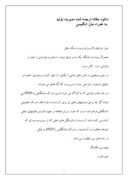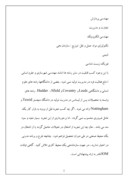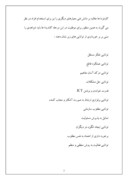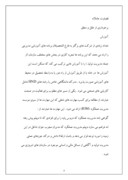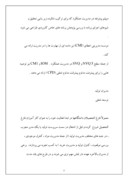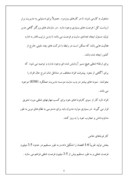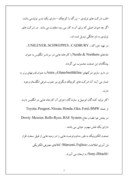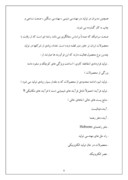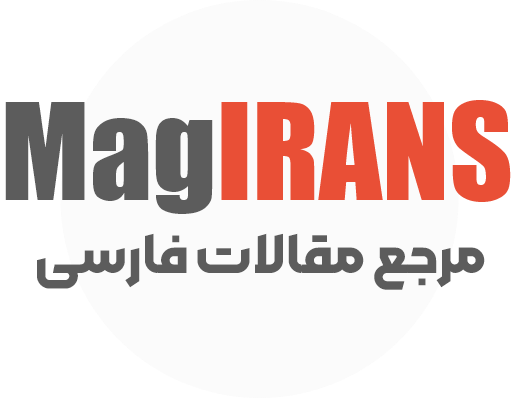بخشی از مقاله
دانلود مقاله ترجمه شده مدیریت تولید
به همراه متن انگلیسی
پیش نیازهای لازم برای ورود به یک شغل
معمولاً رسیدن به جایگاه یک مدیر موفق تولید ، مستلزم برخوداری از تجارب فراوانی است . اکثر مردم
در چنین موقعیتی در نقس های جانبی ( مکمل ) از قبیل کنترل موجودی ، تجزیه و تحلیل وضعیت ، طراحی مواد یا سرپرست کارگاه ظاهر می شودند .
در حال اغلب افرادی که به کارگاه می شوند داری مدرک دانشگاهی یا HND می باشند اگر چه برخی فرصتهای شغلی نیز برای آن دسته از افراد فاقد مدرک تحصیلی دانشگاهی فراهم شده است که خود را برای مطالعه ئر جهت افزایش قابلیتهای شغلی آماده می کنند مانند آن دسته از شایستگی های شغلی که از سوی موسسه ای که خواهان فعالیت در آن هستید ، مدرک دانشگاهی یا HND در یکی .
از رشته های زیر مطلوب می باشد .
مهندسی مکانیک
علم تغذیه
مهندسی پردازش
تجارت و مدیریت
مهندسی الکترونیک
تکنولوژی مواد حمل و نقل /توزیع / سازمان دهی
شیمی
فیزیک زیست شناسی
با این وجود کسب قابلیت در سایر رشته ها (مانند مهندسی شهرسازی و علوم انسانی ) مانع فعالیت فرد در مدیریت تولید نمی شود . بعضی از دانشگاهها رشته های علوم انسانی و دانشگاهی Leeds و Coventry و Sfield ، Hudder . رشته های وابسته به تحصیلات پس از لیسانس در مدریت تولید در دانشگاه منچستر Tessid و Nottingham ارائه می شود .
اگر چه کسب تجربه قبل از ورود به بازار کار یک عامل ضروری محسوب نمی گردد . اما برحورداری از این تجربه بسیار مفید و سود مند می باشد . حال چه این تجربه از اشتغال در تعتیلات حاصل گردد یا از اشتغال در یک محیط صنعتی در طی دوران تحصیل فراهم شود . چنانچه طرح و برنامه مدرنی در اختیار ندارید ، در جهت سازماندهی یک محیط کاری تلاش کنید . گاهی اوقات IOM قادر به ارئه پیشنهاداتی است .
کارفرما ها علاوه بر دانش فنی معیارهای دیگری را نیز برای استخدام افراد در نظر می گیرند به همین منظور برای موفقیت در این مرحله کاندیدا ها باید شواهدی را مبنی بر بر خورداری از توانایی های زیر نشان دهند :
توانایی تفکر مستقل
توانایی عملکرد قاطع
توانایی درک آسان مفاهیم
توانایی حل مشکلات
قدرت خواندن و نوشتن ICT
توانایی برقراری ارتباط به صورت آشکار و مجاب کننده
توانایی مطلوب سازمانی
تمایل به پذیرش مسئولیت
توانایی ایجاد انگیزه در دیگران
برخورد داری از اعتماد به نفس مطلوب
توانایی فعالیت به روش منطقی و منظم
قضاوت عادلانه
برخوداری از عقل و منطق
آموزش
تعداد زیادی از شرکت های بزگتر به فارغ التحصیلان برنامه های آموزشی مدیریتی را ارئه می دهند که این برنامه ها تجربه کاری در بخش های مختلف سازمان (از جمله مدیریت تولید ) را با آموزش هایی ترکیب می کند که ممکن است این آموزش ها در خانه یا از طریق آموزش از راه دور یا به واسطه تحصیل در محیط های آموزشی صورت پذیرد . مدرک دانشگاهی خاص یا رشته های HND شامل کاریابی های صنعتی می شود . یکی از مسیر های مطلوب
برای فعالیت در صنعت عبارتند از مطالعه برای کسب مهارت های شغلی که این مهارت ها از سوی موسسه مدیریت عملکرد (IOM) ارائه می شود . این مهارت ها عبارتند از :
گواهی نامه مدیریت عملکرد که دروس پایه را برای افرادی که تا دیپلم پیش رفته اند فراهم می سازد دیپلم مدیریت عملکرد که مدیران مجرب جوان شاغل در این زمینه را مورد توجه قرار می دهد و باعث ارتقاء دانش و درک حوزهای عملی مدیریت تولید و آگاهی از مسائل مالی و انسانی موجود در سازمان های امروزی می شود .
دیپلم پیشرفته در مدیریت عملکرد که برای ترکیب شالوده زیر بنایی تحقیق و شیوهای اجرای برنامه با بررسی پژوهش برنامه های خاص کاربردی طراحی می شود .
موسسه مدیریتی اعطای (CMI) نیز دامنه ای از مهارت ها را در مدریت ارائه می کند .
از جمله سطح 5 NVQ و SVQ در مدیریت عملکرد . IOM و CM1 نیز توصیه هایی را برای پیشرفت مداوم پیشرقت مداوم شغلی (CPD ) ارائه می دهند .
مدیران تولید
توسعه شغلی
معمولاً فارغ التحصیلان دانشگاهها در ابتدا فعالیت خود را به عنوان کار آموزان فارغ التحصیل شروع کرده و قبل از اشتغال در سمت سرپرست تولید یا یک مدیر مجرب ، در جنبه های مختلف مدیریت تولید (از جمله مدیریت مواد ، کنترل موجودی ، بررسی موقعیت ، کنترل تولید و مدیریت خرید ) به کسب تجربه می پردازند. برخی از مدیران بالاخره عهده دار نقش مهم تری می شوند و در طرح های بلند مدت مشغول به کارمی شوند تا در کارهای روزمره . معمولاً برای دستیابی به مدیریت برتر (ریاست کل ) فرصت های بسیاری وجود دارد . در سازمان های بزرگتر گاهی مدیر تولید مسئول ایجاد تعدادی سایت و فرصت می باشد تا بدین ترتیب قادر به اداره فعالیت هایی باشد که ممکن است در رابطه با شرکت های چند ملیتی خارج از کشور ایجاد شده باشد .
برای ارتقاء شغلی هیچ مسیر آزمایش شده ای وجود ندارد و توصیه می شود که برای آگاهی از نحوه پیشرفت افراد مختلف در مشاغل شان شرح حال افراد را بحواننند . نمونه های بیشتر در وب سایت موسسه مدیریت عملکرد (IOM) موجود می باشد .
افراد تازه کار از سوی کارفرما های خود برای کسب مهارتهای شغلی مورد تشویق قرار می گیرند در بسیاری موارد مدیران باید برای دسترسی به نظام های نوین به طور مداوم دانش و تجارب خود را به روز کنند.
کار فرماهای خاص
بخش تولید تقریباً 6/1 اقتصاد را تشکیل داده و به طور مستقیم در حدود 5/3 میلیون فرصت شغلی و به طور مستقیم بیش از 5/3 میلیون فرصت شغلی فراهم می سازد . اغلب شرکت های تولیدی – بزرگ یا کوچک – دارای یک مدیر تولیدمی باشند اگر چه عنوان اصلی که برای آن به کار می رود متفاوت می باشد . در شرکت های تولیدی به نام خانگی تبدیل شده اند :
در تهیه خوراک ، CADBURY ، SCHWEPPES ،UNILEVER ، غذاهای Nestle & Northern با کارخانه هایی در سرتاسر انگلیس به عنوان پیشگامان این صنعت محسوب می گردند
در دارو سازی شرکتهای GlanoSmithkline و Astra به عنوان قدرتهای برتر به شمار می آیند آما شرکت های کوچک دیگری نیز جنوب شرقی انگلستان وجود دارند .
اکثر تولید کنندگان اتومبیل و سازندگان اجزای آن کارخانه هایی در انگلیس دارند از جمله BMW ،Ford ،Gkn ،Honda ،Nissan ،Peugeot ،Toyota
در بخش هوا فضا و دفاع BAE System ،Rolls-Ryce ،Dowty Messier دارای یک نقش مهم و حیاتی می باشند .
صنعت الکترونیک به طور مداوم فرصت هایی را در زمینه هایی از قبیل سخت افزار فن آوری اطلاعات (Fujitsu ،Marconi) کالاهای مصرفی الکتریکی (Hitachi،Sony) به ارمغان می آورند .
همچنین مدیران در تولید در مهندسی شیمی ، مهندسی سنگین ، صنعت نساجی و چاپ به کار گمارده می شوند.
صنعت سرامیک که عمدتاً براساس سفالگری می باشد رشته ای است که از رقابت با محصولات ارزان تر خاور دور لطمه دیده است. تعداد زیادی از شرکتها در تولید چندین نوع محصول فعالیت دارند که این فرآورده ها عبارتند از :
. تولید قراردادی (مقاطعه کاری ) (ساخت ویژگی های کوچک و منفرد دامنه بزرگی از محصولات )
. تولید انبوه (دامنه محدودی از محصولات که به مقدار بسیار زیادی تولید می شود )
. تولید فرآیند (معمولاً شامل فرآیند های شیمیایی است تا فرآیند های مکانیکی 9
. منابع پست های خالی (جاهای خالی )
. آینده فینالیست
. آینده دفتر رهنما
. دفتر راهنمای Hobsons
. راه حل های مهندسی تولید
. محصولات در حال تولید الکترونیکی
. عصر الکترونیک
. قهرستی از پست های خالی سرویس مشاغل
. روزنامه های ملی در قطع بزرگ
. مطبوعات محلی
. نمایندگی های استخدام متخصص در بخش تولید
مشاغل وابسته
مدیر توزیع / سامان دهی
مهندسی تولید
مهندسی سیستم های در حال تولید
مهندس مواد
پژوهشگر کاربردی
مهندس پردازش
مدیر تضمین کیفیت
Production management
www.prospects.ac.uk/links/occupations Page 1 of 4
Entry Requirements
Considerable experience is normally required to become a fully-fledged production manager. Most people in such a
position have usually worked in subsidiary roles, such as inventory control, configuration analysis, material planning or as
a supervisor.
Nowadays, most entrants to the profession have a degree or HND, but there are also opportunities for non-graduates
who are prepared to study f
or professional qualifications, such as those offered by The Institute of Operations
Management (IOM) or the Institute of Leadership and Management (ILM).
A degree/HND in one of the following disciplines is desirable, depending on the type of industry you wish to work in:
mechanical engineering;
food science/technology;
process engineering;
business/management;
electrical and electronic engineering;
materials science/technology;
transport/distribution/logistics;
chemistry;
physics;
biochemistry.
However, a qualification in some other discipline (eg, civil engineering, the humanities) would not preclude a person from
working in production management given sufficient motivation and a willingness to study for the relevant professional
qualifications. A few universities offer degree courses in production management: Coventry, Huddersfield, Leeds and
University of the Arts. Postgraduate courses in production management are offered at Teesside, Nottingham and the
University of Manchester.
Pre-entry experience, while not essential, would be very useful, whether it takes the form of vacation employment or a
work placement in an industrial environment during your course. If formal schemes are not open to you, try to arrange a
work-shadowing placement. The IOM may be able to offer suggestions.
Employers will be looking for more than just technical knowledge and, to make a success of this career, potential
candidates will need to show evidence of the following:
ability to think on your feet;
•
ability to act decisively;
•
ability to grasp concepts easily;
•
problem-solving capabilities;
•
ICT literacy;
•
ability to communicate clearly and persuasively;
•
good organisational skills;
•
willingness to accept responsibility;
•
ability to work under pressure and to deadlines;
•
good physical health;
•
ability to motivate others;
•
self-confidence;
•
ability to work in a logical, systematic manner;
•
good judgement;
•
common sense.
Training
Many larger companies offer a graduate management training scheme, which combines work experience in different
parts of the organisation (including production management) with training, which may be in-house, by distance learning
or involving study at an educational institution. Certain degree and HND courses include industrial placements. One
favoured route for those working in industry is to study for the professional qualifications offered by The Institute of
Operations Management (IOM). These include:
•
the Certificate in Operations Management, which provides a foundation course for those progressing to the
Diploma;
•
the Diploma in Operations Management, which is aimed at young professional managers working in the field,
developing knowledge and understanding of the practical areas of production management and awareness of the
human and financial issues found in modern organisations;
•
the Advanced Diploma in Operations Management, which is designed to combine a broad foundation in research
and project techniques with a specific applied research investigation.
The Chartered Management Institute (CMI) also offers a range of qualifications in management, including a Level 5 NVQ
and SVQ in Operations Management.
Both the IOM and the CMI offer advice on continuous professional development (CPD).
Production manager
Career Development
Graduates often start off as graduate trainees and gain experience in a number of different aspects of production
management (such as materials management, inventory control, configuration analysis, production control, purchasing
management) before moving on to become production supervisor or shift manager.
Some production managers eventually assume a more strategic role and become involved with long-term planning rather
than day-to-day operations. There are often opportunities to move into general management. In larger organisations a
production manager may well be responsible for production on a number of sites, and opportunities to set up and
manage operations overseas may arise with multinational firms.
There is no one tried and tested way of moving up in the profession and you are advised to read the case studies to see
how different individuals have progressed in their careers. Further examples are available on The Institute of Operations
Management (IOM) website.
Many who are new to the profession find they are encouraged by their employers to acquire a professional qualification,
and it may well prove advantageous to do so (see Training). In any case, managers need to continually update their
knowledge and experience as new systems and processes become available.
Typical Employers
The manufacturing sector accounts for about one sixth of the economy, providing around 3.5 million jobs directly and
many more indirectly. Most manufacturing companies - large and small - have a production manager, though the actual
title will vary. In very small companies, which are often privately owned, the job may be combined with other functions.
Many
manufacturing companies have become household names:
•
in food processing, Cadbury, Schweppes, Unilever, Nestle and Northern Foods are among the leaders, with plants
throughout the United Kingdom;
•
in pharmaceuticals, GlaxoSmithKline and Astra Zeneca are prominent but there are many other smaller
companies, mainly in the South East of England;
•
many automobile manufacturers and component makers have plants in the UK, including BMW, Ford, GKN,
Honda, Nissan, Peugeot and Toyota;
•
in the aerospace and defence sector, BAE Systems, Rolls-Royce, Dowty Messier and Smiths Industries play an
important role.
•
the electronics industry continues to offer opportunities in such fields as information technology hardware (Fujitsu,
Marconi) and electrical consumer goods (Sony, Hitachi).
Production managers are also employed in chemical engineering, heavy engineering, textiles and the printing industry.
The ceramics industry, based m
ainly in the Potteries, is in decline, suffering competition from cheaper products from the
Far East.
Many companies are involved in several types of production, which can include:
•
jobbing production (the manufacture of small, often single qualities of a large range of products made to order);
•
mass production (a small range of products manufactured in very large quantities);
•
process production (usually involving chemical, rather than mechanical processes);
•

